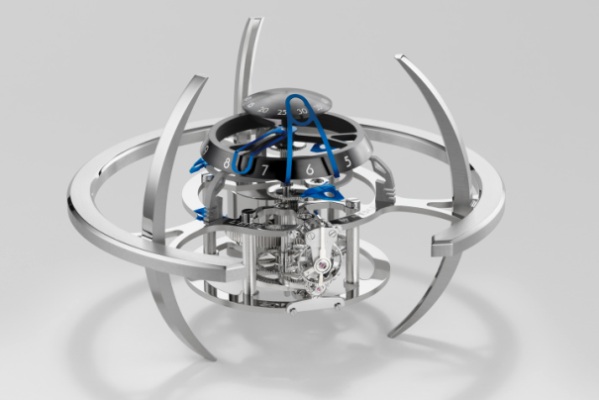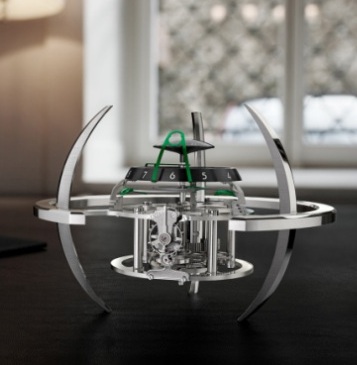The New MB&F x L’Epée Starfleet Explorer Futuristic Clock
By Olga_Gafurova Wednesday, 13 May 2020 9:14 PM

Six years after the launch of the Starfleet Machine, the first clock co-created by MB&F and L'Epée 1839, a new expedition is underway. The space station returns in 2020, in a more compact size and enhanced with bright colours, accompanied by a fleet of three small spacecraft exploring the universe; it rightfully bears the name of Starfleet Explorer.
Designed by MB&F, the Starfleet Explorer is an intergalactic spaceship-cum-table clock crafted by L’Epée 1839, the last remaining Swiss manufacture specialised in high-end table clocks. Not only does it display the hours and minutes, it also features an animation in which three spacecraft perform a five-minute orbit of the station. The highly visible, superlatively finished in-house movement boasts an exceptional eight-day power reserve. The mechanism can be manually wound using a double-ended key serving to wind the movement as well as to set the time.

Hours and minutes are indicated by means of two discs, along with an aperture and a brightly-coloured hand. More specifically, the minutes on a revolving radar dish are read off when they appear through the centre of a fixed metal aperture, satin-brushed by hand and anodised, that follows the dome’s curved contours.
The hours disc placed just below remains motionless. An hour hand – likewise satin-brushed and anodised – indicates the hour by spinning in its place and performing a complete turn around the disc in 12 hours.
Starfleet Explorer also features a significantly original new element in the form of three tiny spacecraft, lined up along the same axis at regular intervals and placed inside the actual Starfleet movement, the heart of the mechanism, around which they revolve at a rate of one full turn every five minutes: a space exploration guided by the mothership.

The Starfleet Explorer’s movement is placed horizontally, but its escapement is vertically positioned. The impeccably finished stainless stain or palladium-treated brass components (with the exception of the 11 jewels) are designed and manufactured in the L’Epee 1839 Swiss atelier. The gears and mainspring barrel are on full display thanks to the skeletonised mainplate and concentric C-shaped external structure. The Starfleet Explorer can rest on both ends of its vertical landing gear; a useful feature when turning it over to wind the mainspring and set the time. It can also be leant sideways so as to offer a different view of the intergalactic horological station.
Starfleet Explorer is launched as three limited editions of 99 pieces each in blue, green and red.

Table clocks – (extremely) large watches
The Starfleet Explorer is a table clock, featuring essentially the same mechanisms as a wristwatch, only larger: gear train, mainspring barrel, balance wheel, escape wheel and pallet-lever. L’Epée 1839’s regulator also features an Incabloc shock protection system, something generally only seen in wristwatches, which minimises the risk of damage when the clock is being transported.
One might be tempted to think that the more substantial size of the components simplifies work. Larger components, however, make finely finishing the movement much more difficult to handle than finishing a wristwatch, because of the bigger surface areas.
Arnaud Nicolas, CEO L’Epée 1839 explains: “It’s not just a case of double the size of the components, it’s double the time it takes to finish them. The complexity increases exponentially. For polishing you need to apply the same pressure as you would finishing a watch movement, but on a bigger surface, and that’s more challenging. It’s thanks to the experience and dexterity of our clockmakers that the Starfleet Explorer can feature such superlative fine-finishing.”
Form follows function
The details of the polished movement can be fully appreciated by the naked eye, thanks in large part to the Starfleet Explorer’s extremely open concentric C-shaped external structure, to which the mainplate is attached.
The outermost C-shape features three vertical arcs on which the clock rests. These graceful supports play a role in the design of the model, but also have a very practical application: to enable the Starfleet Explorer to be placed upside down for time-setting and rewinding using a special key.




























Add new comment